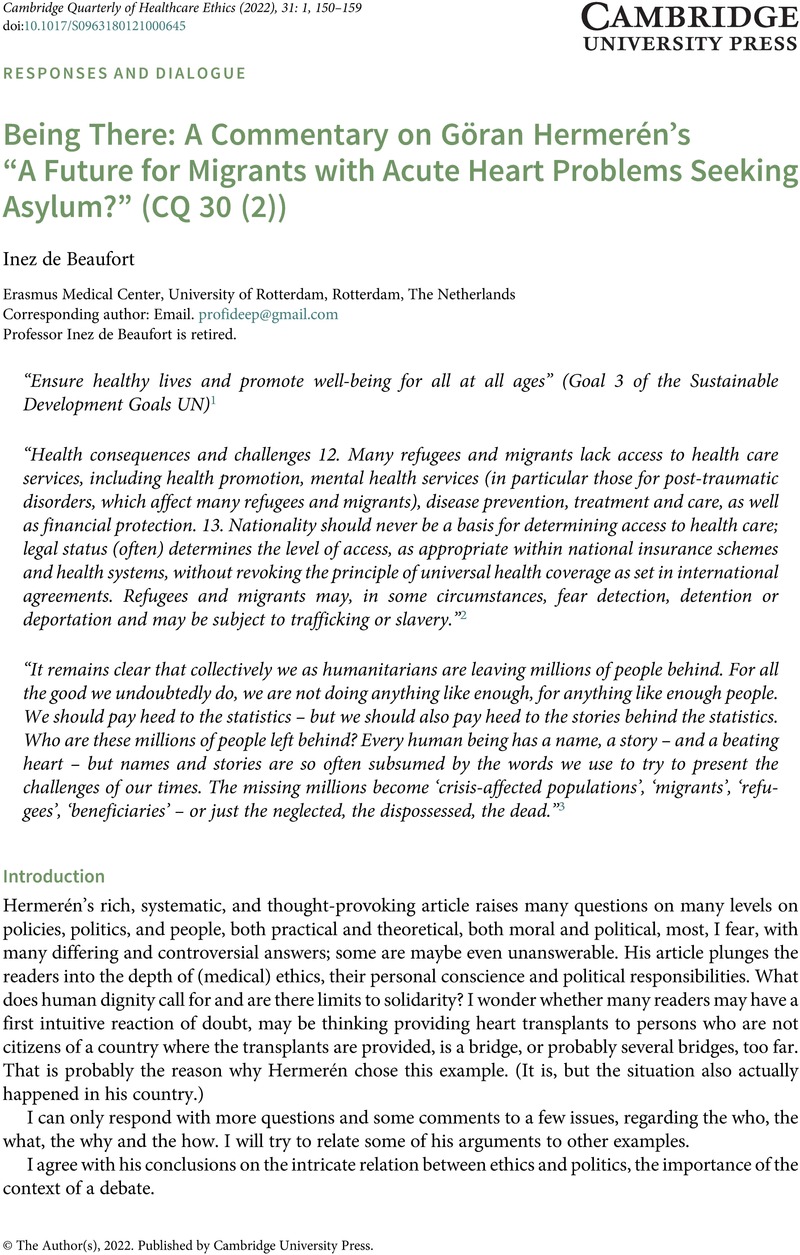No CrossRef data available.
Article contents
Being There: A Commentary on Göran Hermerén’s “A Future for Migrants with Acute Heart Problems Seeking Asylum?” (CQ 30 (2))
Published online by Cambridge University Press: 20 January 2022
Abstract

- Type
- Responses and Dialogue
- Information
- Copyright
- © The Author(s), 2022. Published by Cambridge University Press
Footnotes
Professor Inez de Beaufort is retired.
References
Notes
1. UN Sustainable Development Goals 2030.
2. WHO Draft Global Action Plan. Promoting the health of refugees and migrants (2019–2023); available at https://apps.who.int/gb/ebwha/pdf_files/WHA72/A72_25-en.pdf (last accessed 21 Mar 2021).
3. Leaving Millions Behind. World Disasters Report. IFRC 2018, Foreword Mr Elhadj.
4. See UNHCR Handbook on procedures and criteria for determining refugee status and guidelines on international protection. Geneva 2019. Obviously, the issue of available health care also holds for migrants and irregular migrants.
5. Göran Hermerén, “A Future for Migrants with Acute Heart Problems seeking Asylum, CQ 30 (2), discusses a more modest interpretation “Perhaps the dignity argument and its underlying moral principle should be understood more modestly, so that they apply only to people within a certain geographical area, holding certain passports, or having contacts and resources that make it possible for them to travel to other countries. The objection to this, however, is obvious: it cannot be excluded that those who do not have these qualifications may suffer more, and have stronger needs for health care. Hence, the scope of the argument is obviously important.”
6. The notion of perfect and minimally good Samaritans comes from Thomson’s classical article on abortion Thomson, JJ. A defense of abortion. Philosophy &Public Affairs 1971; 1(1)Google Scholar.
7. This is of course different if one already resides in a country.
8. Of course, this is also a rather general and vague concept. And in fact, it might include heart transplants. But though there may be a gray area, I think the appendicitis and the birth situation would certainly qualify.
9. Alas, irregular migrants do not ask for help or too late, also because the systems of healthcare and finding them in order to send them away are often related. It is therefore dangerous to seek help, as it may lead to eviction.
10. The problem is complicated enough, we cannot have more complications regarding possibly pressured or fragile donors.
11. I use the term tourism, but it is more dramatic than that, may be treatment-travel would be better.
12. For example, it is possible to have preimplantation diagnosis which, for example, in my country is regulated strictly on moral grounds, in Cyprus. Advertisements suggest to combine this with a nice holiday.
13. WHO website, accessed 13 July 2020.
14. I realize this is a simplification. I will just not touch upon the problem of holding citizens of Y responsible for accepting bad leaders, civil wars, and so forth.
15. Global Preparedness Monitoring Board. A world at Risk, Annual Report on global preparedness for Health Emergencies. Geneva: Global Preparedness Monitoring Board; 2019. Very interesting reading now that we know what has happened since.
16. Irregular migrants in the EU are entitled to around 35 percent of the health services available to nationals, mostly relating to emergency care, for example, Ingleby D, Petrova-Benedit R. Recommendations on access to health services for migrants in an irregular situation: An expert consensus. Brussels: International Organization for Migration (IOM) Regional Office, Brussels; 2016. Although some countries waive restrictions for antenatal care and treatment infectious diseases, these measures are ineffective without access to primary healthcare that would provide continued care or detect these diseases, for example, De Vito E, de Waure C, Specchia ML, Ricciardi W. Public Health Aspects of Migrant Health: a Review of the Evidence on Health Status for Undocumented Migrants in the European Region. Health Evidence Network Synthesis Report No. 42. Copenhagen: WHO Regional Office for Europe; 2015. In many contexts, all but life-saving assistance requires upfront payment of often-unaffordable fees (Aldridge R et al 2017. Falling through the cracks: The failure of universal healthcare coverage in Europe. Observatory report, European network to reduce vulnerabilities in health.). Directly linking immigration control to access to services is increasing. Healthcare providers in five European Union (EU) countries are legally required to report undocumented migrants to immigration authorities. Confidentiality is only assured in 10 countries. In the UK, this is part of a range of measures where landlords and banks are also required to carry out immigration checks. Such environments deter migrants from seeking healthcare and result in alternative strategies such as self-medication, contacting doctors in social networks and borrowing health insurance and identity cards (Vito E et al. Public health aspects of migrant health. A review of the evidence on health status for undocumented migrants in the European Region. Health Evidence Network Synthesis Report. no 42. Copenhagen: WHO Regional Office for Europe; 2015). In the UK, research has indicated that a third of irregular migrants avoid timely healthcare and a quarter of pregnant migrants without status had not accessed antenatal care at 18 weeks (Bulm) Leaving millions behind. World Disasters Report 2018, IFRC Geneva.
17. Such plans exist. See apart from the ones already mentioned and developed by the WHO, the IFRD, the UNHCR, for example, WHO Regional Office for Europe. Environmentally Sustainable Health Systems: A Strategic Document. Copenhagen: WHO Regional Office for Europe; 2017.
18. IFRC Secretary General. Leaving Millions behind. World Disasters Report 2018. Executive Summary. Geneva: IFRC Secretary General; 2018.


